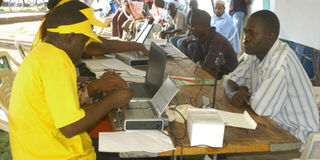US urged to safeguard Kenya elections

Clerks register voters at the start of the voter registration exercise at the Aga Khan Hall in Kisumu in this file photo. An influential US think tank is urging the Obama administration to take steps to ensure Kenya's elections are peaceful and fair January 10, 2013.
What you need to know:
The UK and European Union are mentioned as potential partners of the US in such a coalition.
Memo says pressure on the Kenyan government could include a direct message from President Barack Obama.
An influential US think tank is urging the Obama administration to take steps to ensure Kenya's elections are peaceful and fair.
In a "contingency planning memorandum" published on Thursday, the New York-based Council on Foreign Relations warns of the threat of violence in connection with the March voting and suggests that US actions could "significantly improve the prospects for acceptable elections and help avert a major crisis."
The council's memo, written by Kenya politics expert Prof Joel Barkan, specifically calls on the Obama administration to "bring together like-minded states to push the Kenyan government to make adequate preparations for credible elections".
The UK and European Union are mentioned as potential partners of the US in such a coalition.
The memo adds that pressure on the Kenyan government could include a direct message from President Barack Obama.
Sources in Washington told the Nation that President Obama is expected to make a public pronouncement on Kenya's elections later this month or early in February.
Prof Barkan also recommends that the US "rapidly provide any assistance that the IEBC may require to administer credible elections."
The memo warns that the IEBC is currently "unable to prepare for the elections so that Kenyans can go to the polls with confidence".
Key concerns
Delays in procuring essential equipment and the difficulty of recruiting and training up to 120,000 workers at polling places are cited as key concerns.
The US should also initiate and pay for "a robust and coordinated international electoral observation mission to monitor preparations for the elections, the conduct of the elections, and the reporting of the results," the memo states. Observation should begin no later than January 15, Prof Barkan urges.
In addition, the memo calls on the US to signal its "unequivocal support" for continued diplomatic engagement in Kenya by the African Union's Panel of Eminent Personalities chaired by Kofi Annan.
The assessment prepared for the Council on Foreign Relations offers two starkly contrasting scenarios for Kenya.
"If the elections are largely peaceful and viewed as 'free and fair,' they will bring Kenya's new Constitution, adopted in 2010, fully into force and advance the country's progress toward becoming a modern democratic state," the memo predicts.
On the other hand, "if the elections are marred by widespread violence and perceived as illegitimate by the Kenyan public, they are likely to plunge the country into a renewed period of political instability and set back Kenya's democratic advance," the memo states.
"A breakdown in the electoral process will also do serious harm to Kenya's economy."
Ethnic lines
Instability in Kenya will hurt US interests throughout East Africa, the memo warns.
Prof Barkan also points to several factors that, he writes, make the prospects for violence in the run-up and aftermath of the elections "particularly high".
One cause for concern is that "the leading presidential candidates are mobilizing voters along ethnic lines".
Tensions will run high because "the race for the presidency is likely to be extremely close," Prof Barkan adds.
He also cites the unprecedented complexity of the balloting, a variety of technical problems expected to befall the IEBC, and the inadequate numbers and professionalism of Kenya's police.
"Ongoing proceedings of the International Criminal Court could complicate the presidential election and its outcome," the analysis adds.




